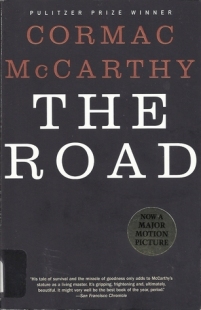Stats 
Publisher: Vintage Books/Random House
Published: 7 April 2009
Word Count: 287 pages
Format: Paperback
Rating: ![]()
![]()
![]()
![]()
Purchase: Amazon, Book Depository, Indie Bound
Synopsis
A father and his son walk alone through burned America. Nothing moves in the ravaged landscape save the ash on the wind. It is cold enough to crack stones, an when the snow falls it is gray. The sky is dark. Their destination is the coast, although they don’t know what, if anything, awaits them there. they have nothing; just a pistol to defend themselves against the lawless bands that stalk the road, the clothes they are wearing, a cart of scavenged food–and each other.
The Road is the profoundly moving story fo a journey. It boldly imagines a future in which no hope remains, but in which the father and his son, “each the other’s world entire,” are sustained by love. Awesome in the totality of its vision, The Road is an unflinching meditation on the worst and the best that we are capable of: ultimate destructiveness, desperate tenacity, and the tenderness that keeps two people alive in the face of total devastation.
(via Goodreads)
&&&
The Road is the fourth Cormac McCarthy book I’ve read. I love his writing and style, and he’s definitely one of my favorite writers, though I do admit that he’s an acquired taste–like a bitter pinot noir. I’d say The Road is the most digestible novel for mainstream audiences, and it’s a great place to start with his writing. It’s not the best of his novels (my favorite is still Blood Meridian), but you’ll know if you get along with his writing or not.
The Road tells the story of a nameless man and his young son who journey across the bleak, destroyed American landscape hoping to find more survivors. Readers aren’t told what happened, just that everything is covered in ash and there are many fires–hinting towards an explosion, be it natural or otherwise. The novel also doesn’t tell us if the disaster is relegated to just America or if it extends to the rest of the world. Partly, that’s because this novel isn’t concerned with the disaster itself: it’s concerned with the relationship between the father and son as they make their journey.
This isn’t a happy story, or a hopeful story. It’s as bleak and dark as the landscape it details, and it’s as unforgiving to the reader as the environment is to the father and son. McCarthy doesn’t shy away from disturbing details. For example, there is the mention of cannibalism in the novel, and it’s a very real, tension wrought fear between the two characters. McCarthy handles this tension deftly and with great precision, so as to not make it seem overly dramatic or out of place.
“You forget what you want to remember, and you remember what you want to forget.”
I thought McCarthy built the relationship between the father and son well; they felt like realistic characters, and their dialogue matched the tone of the story. I like the fact that they set up the past/present dichotomy of what once was and what now is. The boy doesn’t remember the world outside of the ash heap he walks through every day, and it’s rather heartbreaking to see how little he believes his father’s stories about what the world once looked like before whatever disaster occurred.
My favorite aspect of the novel has to be the remnants of both T.S. Eliot’s “The Wasteland” and the ash heaps from The Great Gatsby. McCarthy’s text looks at the danger of the failed American dream that Fitzgerald set up in Gatsby and brings it to fruition, showing how the world might look and how we might act within it. His is a far bleaker outlook, but a possibility nonetheless.
“Once there were brook trout in the streams in the mountains. You could see them standing in the amber current where the white edges of their fins wimpled softly in the flow. They smelled of moss in your hand. Polished and muscular and torsional. On their backs were vermiculate patterns that were maps of the world in its becoming. Maps and mazes. Of a thing which could not be put back. Not be made right again. In the deep glens where they lived all things were older than man and they hummed of mystery.”
My sole criticism of the text lies in its length–it felt like it should have been a novella rather than a full novel, mainly because there are multiple repetitive actions and bits of dialogue that come up as the novel progresses. It doesn’t necessarily detract from my enjoyment of the novel, but it does make it feel longer than it is. For that reason, I couldn’t give the novel five stars, because it doesn’t equal up to the other works I’ve read by McCarthy.
As I said, I think this novel is a great place to start with McCarthy’s work, and I enjoyed it. I’ll be watching the movie soon, as I’m interested to see how it translates on screen. I think it could be well done, and I’m excited to see it.
Have you read The Road? What did you think?
Until next time, happy reading!
–E. Adeline